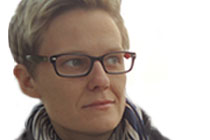Assistant History Professor Awarded Acls Fellowship
April 01, 2015

Colleen Woods will use fellowship to help complete book project.
Updated: 4/2/15, 5:33
The College of Arts and Humanities extends a congratulations to Assistant History Professor Colleen Woods for receiving an American Council of Learned Societies fellowship for 2015-16.
Woods will use the fellowship to complete her book project, “Bombs, Bureaucrats, and Rosary Beads: The United States, the Philippines, and the Making of Global Anti-Communism.”
The book tells the story about how a group of Pilipino and American anti-communists transformed politics in the Philippines by turning local peasant protests into sites of international conflict by building a global narrative around the strife. In doing this, Woods connects this vignette to the larger notion of how “the global,” or the construct within which societies view themselves on the international order, has shifted over time as the world has become increasingly interconnected as a result of international relationships and foreign policies post-World War II. During that time, the U.S. became a global powerhouse, but it was a rise that could not have been accomplished without the help of other interested parties, Woods said.
In the example of the Philippines conflict, U.S. intervention in the form of military and other aid, became “a model and a laboratory to test these ideas,” Woods said. That’s a model that was later tried by the U.S. in Vietnam and in Cuba.
“It’s not a case study,” Woods said. “It’s critically important. It served as a model for decolonization.”
Woods said she plans to have a finalized manuscript by September. It is based on archival research conducted at multiple sites in the Philippines and the U.S. and includes personal papers, U.S. military records and other records from U.S. Foreign Service agencies including U.S Information Agency, the Central Intelligence Agency, Tagalog newspapers, Catholic periodicals and Philippine state and military records.
The ACLS fellowship will provide Woods the writing time she needs to complete the project. It’s “also a recognition of the importance of the work that I'm trying to do and that's always a nice thing,” she said.
Woods’ research interests include U.S. transnational history, decolonization and the Cold War. Last year, the Society for Historians of American Foreign Relations awarded Woods the William Appleman Williams Junior Faculty Research Award.
Woods has a B.A. in history from the University of Michigan (2003), an M.A. from the City University of New York Graduate Center (2006) and a Ph.D. in history from the University of Michigan (2012). She also won the ACLS/Mellon Dissertation Completion Fellowship in 2011-12. Woods was also awarded two Foreign Language and Area Studies Fellowships to study Tagalog/Filipino during graduate school.
ABOUT THE ACLS FELLOWSHIP
This year ACLS made a total of 70 awards to faculty of all ranks and independent scholars to support research in the humanities and humanistic social sciences. ACLS received over 1,000 applications in this cycle, making the program once again the most competitive in ACLS’s portfolio.
“Fellows were chosen for their potential to create new knowledge resulting from investigations and reflections on diverse cultures, texts, and artifacts from across the globe and human history,” said Matthew Goldfeder, director of fellowship programs at ACLS. “ACLS employs a rigorous multi-stage peer-review process to ensure that humanities scholars themselves select those fellows who exemplify the very best in their fields. The 70 fellows this year represent more than 50 colleges and universities and an array of humanities disciplines, including linguistics, religious studies, architectural history, and geography.”
ACLS Fellowships allow scholars to spend six to twelve months on full-time research and writing. The program is funded by ACLS’s endowment, which has received contributions from The Andrew W. Mellon Foundation, the National Endowment for the Humanities, the Council’s college and university Associates, past fellows, and individual friends of ACLS.
For more information about the recipients and their projects, click here.

